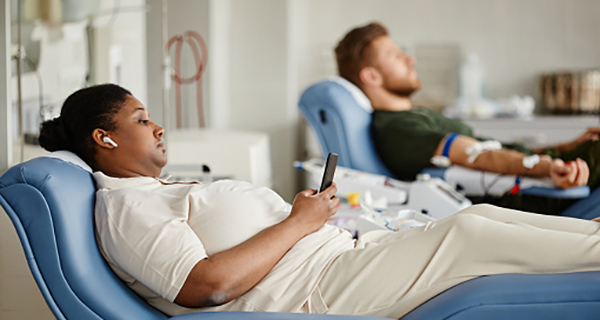Donating blood is a selfless act that has a life-changing impact on hospital patients, and can make you feel good, too – as it should! But it’s natural to wonder if there are physical effects and “what happens to my body after giving blood?
The good news is that any side effects are typically minor and short-lived and are outweighed by the benefits of donating blood.
How blood works in your body
The average adult has about 10 pints of blood. When you donate blood, you temporarily lose about 1 pint, or less than 1% of your body weight. We say temporarily because your body replaces the fluid portion of your blood (which is about half of your blood volume) in a couple days.
The red cells in your blood take a bit longer to replenish. Your body, amazingly, makes about 2 million new red cells a minute, but because it needs billions of red blood cells to operate properly, replacing the ones lost during blood donation takes several weeks. That’s why after you donate blood you need to wait 56 days before giving blood again – so your body has ample time to return to normal. You can rest assured your body will recover!
Temporary effects
Your blood’s main function is carrying oxygen to all parts of your body on the hemoglobin in red blood cells, so donating blood may cause some people brief lightheadedness or dizziness. That’s one of the reasons we have you recline on a donor chair during the donation and ask you to stick around and rest for 15 minutes after your blood donation is complete.
Partaking of the drinks and snacks we offer in our canteens after you donate is important, too. They help replace those fluids and nutrients from your blood donation. You can prepare for your blood donation and reduce or eliminate any physical effects by drinking lots of non-alcoholic fluids, especially water, in the days before and after your donation. Eating a healthy meal before and after you donate also helps, and be sure to include iron-rich foods.
You may feel a little tired after your blood donation, but again, it should be short-lived as your body replenishes what was lost. We recommend abstaining from strenuous activity for the rest of the day after your blood donation to help with this and to avoid strain on your donation arm. It’s a good excuse to put off chores like cleaning the house!
Benefits of blood donation
In addition to the deep satisfaction you get knowing you helped save lives, there are a couple long-term benefits to donating blood. Some studies suggest improved blood sugar control with frequent blood donation. On a more frivolous note, replacement of blood cells and proteins consumes about 450 calories, so feel free to indulge in the canteen!
You receive a mini-physical at every blood donation: We take your temperature, pulse, hemoglobin level and blood pressure. Completed donations are tested for cholesterol, and all this information is stored in your secure online donor account. If something seems amiss, your health history record may alert you to a serious health issue.
Schedule your blood donation today
We hope we’ve set your mind at ease about what happens to your body after you donate blood and that you are ready to schedule your appointment. Our staff are highly trained professionals who will guide you through the donation process.
Remember, blood is needed 24/7, 365 days a year and can only come from generous people like you!
Schedule your blood donation now.

